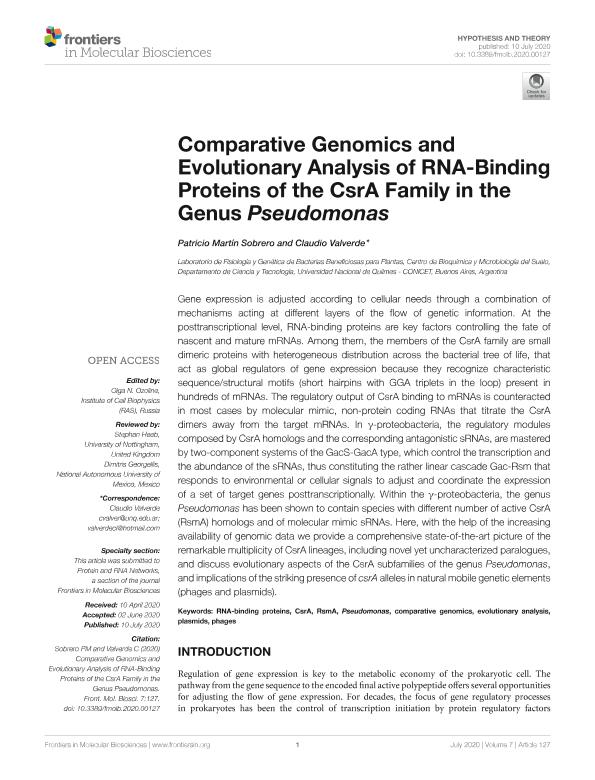Mostrar el registro sencillo del ítem
dc.contributor.author
Sobrero, Patricio Martín

dc.contributor.author
Valverde, Claudio Fabián

dc.date.available
2022-09-16T10:45:37Z
dc.date.issued
2020-07
dc.identifier.citation
Sobrero, Patricio Martín; Valverde, Claudio Fabián; Comparative Genomics and Evolutionary Analysis of RNA-Binding Proteins of the CsrA Family in the Genus Pseudomonas; Frontiers Media; Frontiers in Molecular Biosciences; 7; 7-2020; 1-22
dc.identifier.issn
2296-889X
dc.identifier.uri
http://hdl.handle.net/11336/169028
dc.description.abstract
Gene expression is adjusted according to cellular needs through a combination of mechanisms acting at different layers of the flow of genetic information. At the posttranscriptional level, RNA-binding proteins are key factors controlling the fate of nascent and mature mRNAs. Among them, the members of the CsrA family are small dimeric proteins with heterogeneous distribution across the bacterial tree of life, that act as global regulators of gene expression because they recognize characteristic sequence/structural motifs (short hairpins with GGA triplets in the loop) present in hundreds of mRNAs. The regulatory output of CsrA binding to mRNAs is counteracted in most cases by molecular mimic, non-protein coding RNAs that titrate the CsrA dimers away from the target mRNAs. In γ-proteobacteria, the regulatory modules composed by CsrA homologs and the corresponding antagonistic sRNAs, are mastered by two-component systems of the GacS-GacA type, which control the transcription and the abundance of the sRNAs, thus constituting the rather linear cascade Gac-Rsm that responds to environmental or cellular signals to adjust and coordinate the expression of a set of target genes posttranscriptionally. Within the γ-proteobacteria, the genus Pseudomonas has been shown to contain species with different number of active CsrA (RsmA) homologs and of molecular mimic sRNAs. Here, with the help of the increasing availability of genomic data we provide a comprehensive state-of-the-art picture of the remarkable multiplicity of CsrA lineages, including novel yet uncharacterized paralogues, and discuss evolutionary aspects of the CsrA subfamilies of the genus Pseudomonas, and implications of the striking presence of csrA alleles in natural mobile genetic elements (phages and plasmids).
dc.format
application/pdf
dc.language.iso
eng
dc.publisher
Frontiers Media

dc.rights
info:eu-repo/semantics/openAccess
dc.rights.uri
https://creativecommons.org/licenses/by/2.5/ar/
dc.subject
COMPARATIVE GENOMICS
dc.subject
CSRA
dc.subject
EVOLUTIONARY ANALYSIS
dc.subject
PHAGES
dc.subject
PLASMIDS
dc.subject
PSEUDOMONAS
dc.subject
RNA-BINDING PROTEINS
dc.subject
RSMA
dc.subject.classification
Biología Celular, Microbiología

dc.subject.classification
Ciencias Biológicas

dc.subject.classification
CIENCIAS NATURALES Y EXACTAS

dc.title
Comparative Genomics and Evolutionary Analysis of RNA-Binding Proteins of the CsrA Family in the Genus Pseudomonas
dc.type
info:eu-repo/semantics/article
dc.type
info:ar-repo/semantics/artículo
dc.type
info:eu-repo/semantics/publishedVersion
dc.date.updated
2022-09-15T14:57:23Z
dc.journal.volume
7
dc.journal.pagination
1-22
dc.journal.pais
Suiza

dc.journal.ciudad
Lausanne
dc.description.fil
Fil: Sobrero, Patricio Martín. Universidad Nacional de Quilmes. Departamento de Ciencia y Tecnología. Centro de Bioquímica y Microbiología de Suelos. Laboratorio de Fisiología, Genética de Bacterias para Plantas; Argentina. Consejo Nacional de Investigaciones Científicas y Técnicas; Argentina
dc.description.fil
Fil: Valverde, Claudio Fabián. Universidad Nacional de Quilmes. Departamento de Ciencia y Tecnología. Centro de Bioquímica y Microbiología de Suelos. Laboratorio de Fisiología, Genética de Bacterias para Plantas; Argentina. Consejo Nacional de Investigaciones Científicas y Técnicas; Argentina
dc.journal.title
Frontiers in Molecular Biosciences
dc.relation.alternativeid
info:eu-repo/semantics/altIdentifier/doi/http://dx.doi.org/10.3389/fmolb.2020.00127
Archivos asociados
